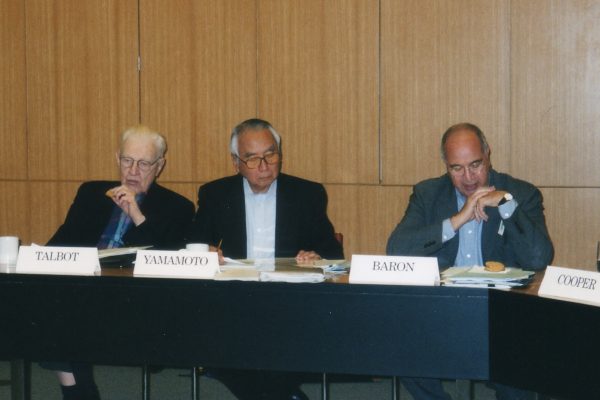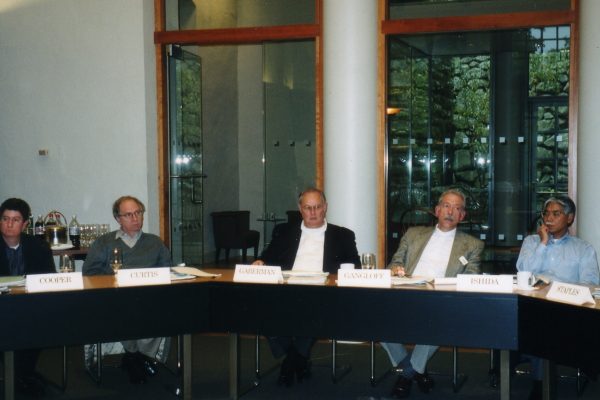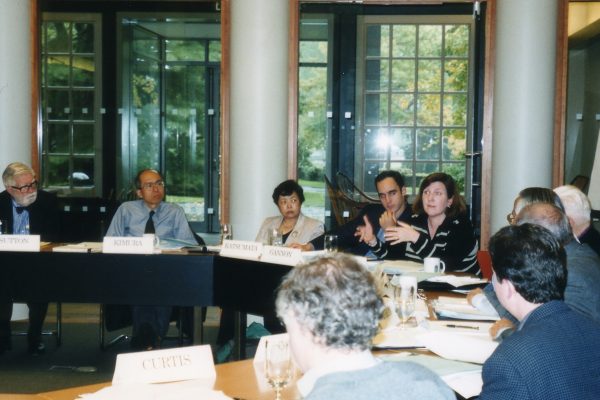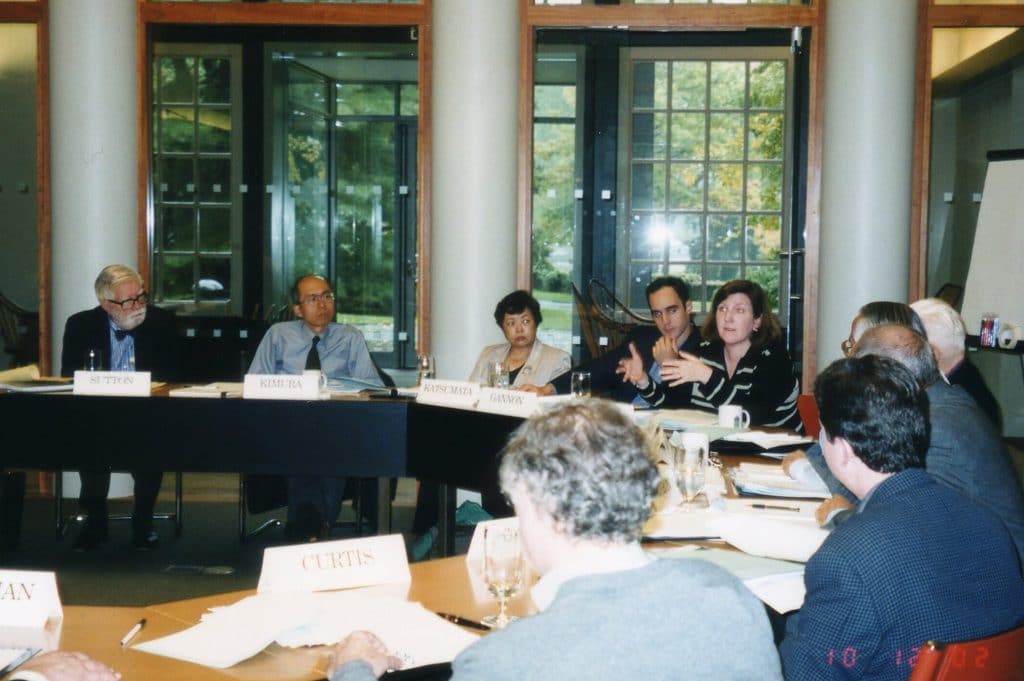On the weekend of October 12–13, 2002, JCIE held a workshop outside New York City at the Pocantico Conference Center of the Rockefeller Brothers Fund as part of its study on the Role of Philanthropy in Postwar US-Japan Relations. The 23 participants, a number of whom were active in US-Japan philanthropy during the period of the study, shared their views regarding the motivations of grantmakers, the influence of the cold war and anticommunist sentiment on Japan-related grantmaking, the relationship between the government and foundations, and the impact of American philanthropy on Japan’s intellectual community and the US-Japan relationship.
October 12
Session I: Introduction
Presentation
Tadashi Yamamoto, President, Japan Center for International Exchange
Project overview
Progress report on research and future plans
Reviewing and revising the research strategy
Workshop agenda
Session II: Historical Context
Presentations of Paper Writers
“The Role of Philanthropy and Civil Society in the Evolution of U.S. Foreign Relations in the Post-World War II Era”
Akira Iriye, Charles Warren Professor of American History, Harvard University
“The Evolution of the Japan-U.S. Intellectual Exchange”
Makoto Iokibe, Professor, Kobe University; Harvard-Yenching Institute Coordinate Researcher
“The Renewed Role of Prewar Business Networks and the Emerging Post-WWII Corporate Role in Japan for US-Japan Exchange and Studies”
Masato Kimura, Director of Research, RYUMONSHA (Shibusawa Eiichi Memorial Foundation); Visiting Professor, University of Toronto
Comments
Gerald Curtis, Burgess Professor of Political Science, East Asian Institute, Columbia University; Director, Toyota Research Program
Discussion
Session III: Changing Priorities of Philanthropic Giving—Preliminary Findings and Hypotheses
Presentations on Preliminary Findings, Hypothesis, and Future Agenda
Changing priorities—Tadashi Yamamoto
Trends analyzed on the basis of the Japanese grantees—Jun Wada, Chief Program Officer, JCIE; Professor, Kanda University of International Studies
Grants to individuals—Kim Ashizawa, Senior Associate, JCIE/USA
Area studies/Japan studies—Kim Ashizawa
American studies—James Gannon, Executive Director, JCIE/USA
English language instruction—James Gannon
Grassroots exchange—Tadashi Yamamoto (representing Toshihiro Menju, Senior Program Officer, JCIE/Japan)
Discussion
October 13
Session IV: Critical Issues Related to the Role of Philanthropy in the Postwar Era—Reflections and Explorations of Lessons to be Learned
Motivations for philanthropic contributions to Japan-related activities in the immediate post-war period (as compared with Europe)
Influence of anti-communism sentiment in the United States on philanthropy in the 1950s and 1960s
Degree of cooperation between the government and philanthropic/ civil society organizations during the Cold War period as well as in the following years
Priority setting and program implementation – roles of board members, senior staff, and field officers
Strategies for building the intellectual underpinnings of the bilateral relationship
Other key issues of salience to international relations and cooperation
Barnett F. Baron, Executive Vice President, The Asia Foundation
Gerald L. Curtis, Burgess Professor of Political Science, East Asian Institute, Columbia University; Director, Toyota Research Program
Greg Cooper, Program Coordinator, Sasakawa Peace Foundation USa
Barry D. Gaberman, Senior Vice President, The Ford Foundation
Eric J. Gangloff, Executive Director, Japan-U.S. Friendship Commission
Peter F. Geithner, Former Representative for Japan, The Ford Foundation; Senior Representative, Hitachi, Ltd. Corporate Office, DC
Pamela Green, Former Staff, The Ford Foundation
Tashi Ishida, Director, The Japan Foundation Center for Global Partnership, New York
Terrill E. Lautz, Vice President and Secretary, The Henry Luce Foundation
Eugene Staples, Former Director, Asia and the Pacific Program, and former Representative for Southeast Asia, The Ford Foundation
Francis X. Sutton, Former Deputy Vice-President and Acting Vice-President of the International Division, The Ford Foundation
Phillips Talbot, President Emeritus, The Asia Society; former Board member, the Council on Economic and Cultural Affairs (JDR 3rd Fund); former U.S. Ambassador to Greece
[Research Team]:
Tadashi Yamamoto, President, JCIE/Japan (Research Director)
Kim Gould Ashizawa, Senior Associate, JCIE/USA (Research Coordinator)
Makoto Iokibe, Professor, Kobe University; Harvard-Yenching Institute Coordinator Researcher
Akira Iriye, Charles Warren Professor of American History, Harvard University
Masato Kimura, Director of Research, RYUMONSHA (Shibusawa Eiichi Memorial Foundation); Visiting Professor, University of Toronto
Hideko Katsumata, Managing Director and Executive Secretary, JCIE/Japan
Jun Wada, Chief Program Officer, JCIE/Japan; Professor and Director of the Intercultural Communication Institute, Kanda University of International Studies
James Gannon, Executive Director, JCIE/USA
Seiko Ihara, Assistant Program Officer, JCIE/Japan
Lisa Weiss, Program Associate, JCIE/USA




